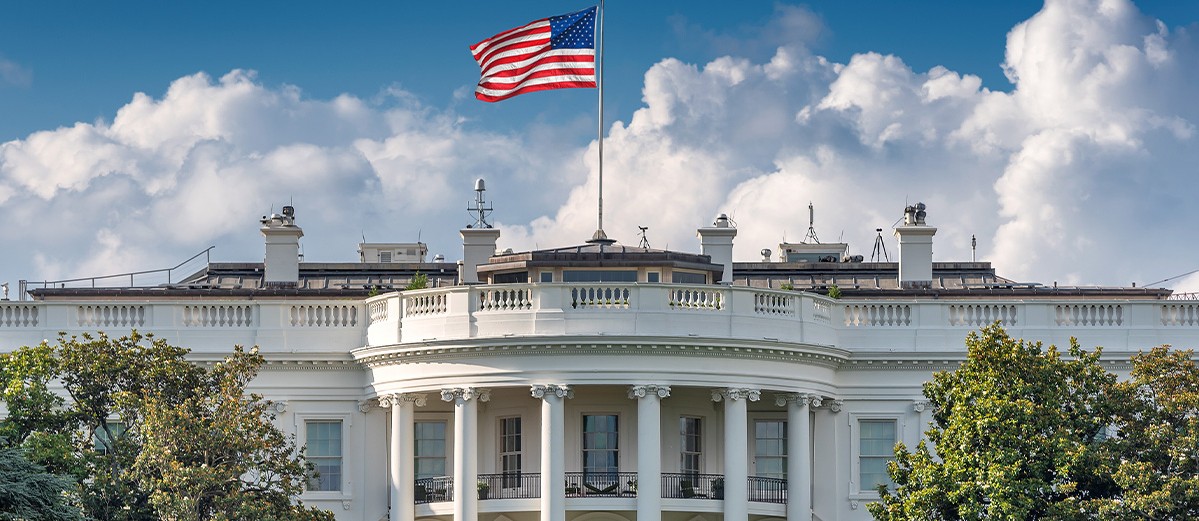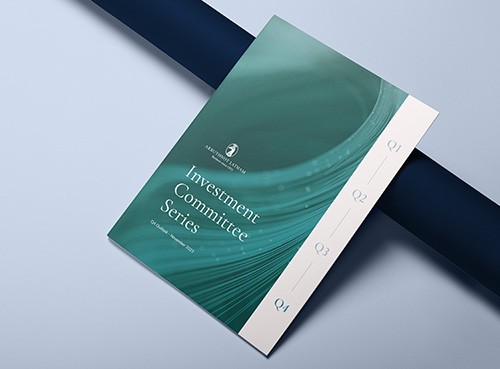

Top of mind -
Navigating the Trump sequel: market implications and uncertainties in a second term
Now that Donald Trump has secured the Republican Party nomination, all eyes are on the global stage for the sequel to 2020’s Trump vs. Biden race for the White House. Here we explore what the implications might be for markets if Trump is victorious.
Trump’s first term impact on markets
Trump’s first presidency (2017-2021) laid down a foundation and a springboard for his prospective second. Policies were expansionary to a fault, with tax-cuts, deregulation and protectionist policies (including trade-wars and ‘The Wall’) contributing to a bullish market.
The S&P500 was up over 50% between Trump’s November 2016 election victory[1] and his November 2020 defeat, driven by strong gains in the Technology and Consumer Discretionary sectors.
It is expected that the strong market performance in his first term will be one of the key messages underpinning his campaign for a second. We have already seen Trump take credit for 2023 stock market gains, on the Trump backed social media platform, Truth Social:
“THIS IS THE TRUMP STOCK MARKET… INVESTORS ARE PROJECTING THAT I WILL WIN, AND THAT WILL DRIVE THE MARKET UP.”
Trump’s second term agenda: Three key headlines
On the campaign trail, Trump has begun laying out his second term agenda. Here we consider three key messages:
Taxes: Pros and cons
Trump has promised to make his 2017 tax cuts permanent (they are due to expire in 2025). He also pledges to ‘rein in’ government spending on areas such as climate subsidies and foreign aid.
PRO: Tax cuts are typically positive for growth retaining what would be tax revenues in the pockets of individuals and companies to spend and invest. As in his first presidency, fiscal loosening like this can be good for business and for markets.
CON: The fiscal deficit in the US is the elephant in the room. In the last 10 years, US government spending has skyrocketed. Tax cuts implemented in Trump’s tenure, along with the Covid-19 stimulus and Biden’s spending under the CHIPS and Inflation Act, many argue the level of US debt is becoming unsustainable. Particularly with cost of debt increasing in a high interest rate environment. A Trump victory, with further tax cuts promised, could push up Treasury yields in the US as investors lose confidence in the likelihood of further debt-ceiling raises and the creditworthiness of the US government.
Deregulation: A balancing act
Trump promises to further reduce the regulatory burden on businesses. He has promised to remove two regulations for every new one proposed.
PRO: A lighter regulatory burden is usually considered to be good for businesses, making it easier for them to operate, expand and trade. Trump 2.0 could therefore be a positive signal on this front.
CON: While it can be a burden, regulation does ensure the safe running of industry, and this is particularly true for financial markets. The rise in regulation since the 2008 Global Financial Crisis has provided confidence in the stability of the financial sector. If Trump’s administration is too heavy handed, deregulation could lead to unforeseen negative consequences down the line.
International relations and trade: America-First agenda
Promising to double-down on his America-First agenda, Trump is touting further restrictions on immigration, a 10% import tariff and becoming more isolationist. He has proposed withdrawing support for Ukraine, withdrawing (again) from the Paris Accord and possibly from NATO.
PRO: Tariffs would be a boost for the US economy. They encourage companies to re-shore overseas operations to the US, which could boost employment. Trump also argues that reducing spend on international affairs will free up capital that can be ‘better spent’ domestically.
CON: Tariffs could have a negative impact on multi-national organisations – which encompasses some of the US’s largest companies – and could disrupt established supply chains. Increasing import costs would put pressure on import prices, increasing the risk of inflation.
While withdrawing from organisations like NATO is likely to have little impact on the US economy itself, it increases geopolitical risks, which are already running very high across the globe.
Uncertain landscape with 10 months to go
With 10 months to go until the next election, it is impossible to know what markets may look like in November. It is also too soon to predict with certainty whether Trump will win the election when the time comes.
As for the potential impact, another Trump era of expansionary policies could give a boost to economic growth in the US which may have trickle-down effects for the global economy. However, terse international relations, loose regulations and increasing fiscal deficit may lead to more uncertainty and reduce confidence.
Market volatility and opportunities
The one thing that is almost certain is that markets will remain volatile. The US election may contribute to the uncertainty this year but there is a myriad of other factors that are also in the mix. This includes central bank policy, ongoing conflict in Ukraine, Gaza and unrest in the Middle East, flagging Chinese growth and the threat of a European recession. The unseen benefit is that volatile markets often create opportunities for active investors with their fingers on the pulse.
In the ever-evolving financial landscape, ongoing analysis and diversification is important. As always, we are closely monitoring market trends and assessing potential impacts on client portfolios, ready to adjust our positioning as necessary to protect capital and to take advantage of opportunities when they arise.
Investment Committee Series
Our Investment Committee share their key decisions and outlook for Q2 2024 here

Author -

Gabriella Macari
Senior Investment Manager
Gabriella Macari, Senior Investment Manager at Arbuthnot Latham, joined the bank in 2019 and has more than 11 years of experience in the investment and wealth management industry. Gabriella played a pivotal role in the development and launch of our Sustainable Portfolio Service in 2021 and led our research coverage of the commercial property market from 2020 to 2022.
She holds the title of Chartered Wealth Manager, Investment Advice Diploma and the Private Client Investment Advice and Management qualification. She holds a BSc (Hons) in Economics from the University of Bath.
Outside of work, Gabriella enjoys cooking, reading, and finding opportunities to practice her Italian. She is also a keen runner and a lifelong Formula 1 fan.
DISCLAIMER
This communication should be considered a marketing communication. It has not been prepared in accordance with legal requirements designed to promote the independence of investment research. It is for information purposes only and does not constitute advice, a solicitation, recommendation or an offer to buy or sell any security or other investment or banking product or service. You should seek professional advice before making any investment decision. The value of investments, and the income from them can fall as well as rise, and may be affected by exchange rate fluctuations. Investors could get back less than they invest. Past performance is not a reliable indicator of future results. The tax treatment of investments depends upon individual circumstances and may be subject to change.
The contents of this communication are based on opinions or conditions as at the date of writing and may change without notice. To the extent permitted by law or regulation, no warranty of accuracy or completeness of this information is given and no liability is accepted for its use or reliance on it.